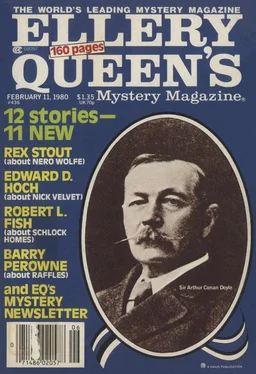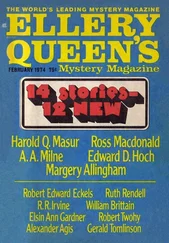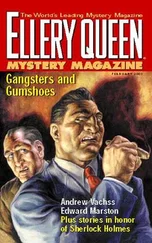William Bankier - Ellery Queen's Mystery Magazine. Vol. 75, No. 2. Whole No. 436, February 11, 1980
Здесь есть возможность читать онлайн «William Bankier - Ellery Queen's Mystery Magazine. Vol. 75, No. 2. Whole No. 436, February 11, 1980» весь текст электронной книги совершенно бесплатно (целиком полную версию без сокращений). В некоторых случаях можно слушать аудио, скачать через торрент в формате fb2 и присутствует краткое содержание. Город: New York, Год выпуска: 1980, ISBN: 1980, Издательство: Davis Publications, Жанр: Детектив, на английском языке. Описание произведения, (предисловие) а так же отзывы посетителей доступны на портале библиотеки ЛибКат.
- Название:Ellery Queen's Mystery Magazine. Vol. 75, No. 2. Whole No. 436, February 11, 1980
- Автор:
- Издательство:Davis Publications
- Жанр:
- Год:1980
- Город:New York
- ISBN:ISSN: 0013-6328
- Рейтинг книги:4 / 5. Голосов: 1
-
Избранное:Добавить в избранное
- Отзывы:
-
Ваша оценка:
- 80
- 1
- 2
- 3
- 4
- 5
Ellery Queen's Mystery Magazine. Vol. 75, No. 2. Whole No. 436, February 11, 1980: краткое содержание, описание и аннотация
Предлагаем к чтению аннотацию, описание, краткое содержание или предисловие (зависит от того, что написал сам автор книги «Ellery Queen's Mystery Magazine. Vol. 75, No. 2. Whole No. 436, February 11, 1980»). Если вы не нашли необходимую информацию о книге — напишите в комментариях, мы постараемся отыскать её.
Ellery Queen's Mystery Magazine. Vol. 75, No. 2. Whole No. 436, February 11, 1980 — читать онлайн бесплатно полную книгу (весь текст) целиком
Ниже представлен текст книги, разбитый по страницам. Система сохранения места последней прочитанной страницы, позволяет с удобством читать онлайн бесплатно книгу «Ellery Queen's Mystery Magazine. Vol. 75, No. 2. Whole No. 436, February 11, 1980», без необходимости каждый раз заново искать на чём Вы остановились. Поставьте закладку, и сможете в любой момент перейти на страницу, на которой закончили чтение.
Интервал:
Закладка:
Ellery Queen’s Mystery Magazine. Vol. 75, No. 2. Whole No. 436, February 11, 1980

Times Change
by Bill Pronzini
© 1979 by Bill Pronzini.
The big flat-faced stranger came into the Elite Barber Shop just before closing that Wednesday afternoon.
Asa was stropping his old Spartacus straight razor, humming to himself and thinking how good a cold lemonade was going to taste. Over at the shoeshine stand Leroy Heavens sat on a three-legged stool, working on his own pair of brogans with a stained cloth; sweat lacquered his face and made it glisten like black onyx. The mercury in the courthouse thermometer had been up to 97 at high noon and Asa judged it wasn’t much cooler than that right now: the summer flies were still heat-drugged, floating in circles on such breeze as the ceiling fan stirred up.
In the long mirror across the rear wall Asa watched the stranger shut the door and stand looking around. Leroy and the shoeshine stand got a passing glance; so did the three 1920s Otis barber chairs, the waiting-area furniture, the open door to Asa’s living quarters in back, the counter full of clippers and combs and other tonsorial tools, and the display shelves of both modern and old-fashioned grooming supplies.
When the eyes flicked over him Asa said, “Sure is a hot one,” by way of greeting. “That sun’ll raise blisters, a person stands under it too long.”
The big man didn’t say anything. Just headed across to where Asa was standing behind the number one chair. He wore a loose-fitting summer shirt and a pair of spiffy cream-colored slacks; dark green-tinted sunglasses hid his eyes. Asa took him to be somewhere in his middle fifties, reckoning from the lines in his face. Some face it was, too: looked as though somebody had beat on it with a mallet to flatten it that way, to get the nose and lips all spread out and shapeless.
The display shelves were to the left of the number one chair; the stranger stopped there and peered down at the old-fashioned supplies. He picked up and inspected a silvertip-badger shaving brush, an ironstone mug, a block of crystal alum, a bottle of imported English lavender water. The left corner of his mouth bent upward in a sort of smile.
“Nice stuff you got here,” he said, and Asa knew right off that he was from up North. New York, maybe; he had that kind of damn-yankee accent you kept hearing on the TV. “Not too many places stock it nowadays.”
“That’s a fact,” Asa agreed. “I’m just about the only barber in Hallam County that does.”
“Sell much of it?”
“Nope, not much. Had that silvertip brush two years now; got a genuine tortoiseshell handle, too. Kind of a shame nobody wants it.”
The stranger made a noise through his flattened nose. “Doesn’t surprise me. All anybody wants these days is modern junk, modern ideas. People’d be a lot better off if they stuck to the old ways.”
“Well,” Asa said philosophically, “things change.”
“Not for the better.”
“Oh, I dunno. Sometimes I reckon they do.” Asa laid the Spartacus razor down. “But sure not in the art of shaving. Now that silvertip there — a real fine piece of craftsmanship, handmade over in France. Make you a nice price on it if you’re interested.”
“Maybe,” the big man said. He edged away from the shelves and went over by the open inner door. When he got there he paused and seemed to take inventory of the room beyond. “You live back there, old-timer?”
“I do.”
“Alone?”
“Yep. You a census-taker, maybe?”
The stranger barked once, like a hound on a possum hunt; then he came back to where Asa was and looked up at the clock above the mirror. “Almost five,” he said. “Sign out front says that’s when you close up.”
“Most days the sign’s right.”
“How about today?”
“If you’re asking will I still barber you, the answer’s yes. Ain’t my policy to turn a customer away if he’s here before closing.”
“Any after-hours appointments?”
Asa’s brows pulled down. “I don’t take after-hours appointments,” he said. “Haircut what you’re after, is it? Looks a mite long over the collar.”
No answer. The big man turned his head and looked over at the front window, where the shade was three-quarters drawn against the glare of the afternoon sun. About all you could see below it was half of the empty sidewalk outside.
Asa ran a hand through his sparse white hair. Seemed pretty quiet in there, all of a sudden, except for the whisper of the push-broom Leroy had fetched and was sweeping up with in front of the shoeshine stand. There was hardly a sound out on Willow Street, either. Folks kept to home and indoors in this heat; hadn’t been much foot or machine traffic all day, and no business to speak of.
“Don’t recall seeing you around Wayville before,” Asa said to the stranger. “Just passing through, are you?”
“You might say that.”
“Come far?”
“Far enough. The state capital.”
“Nice place, the capital.”
“Sure. Lots of things happening there, right? Compared to a one-horse town like this, I mean.”
“Depends on how you look at it.”
“For instance,” the big man said, “I heard there was some real excitement over there just last week. And I heard this barber named Asa Bedloe, from Wayville here, was mixed up in it.”
Asa hesitated. Then, “Now where’d a yankee like you hear that?”
The stranger’s lip bent upward at the corner again. “The way I got it, Asa was in the capital visiting his nephew. While the nephew was at work, Asa wandered downtown to look through some secondhand bookstores because he likes to read. He took a short cut through an alley, heard two guys arguing inside an open doorway, and the next thing he knew, there was a shot and one guy came running out with a gun in his hand. Asa’d already ducked out of sight, so the guy didn’t see him. But Asa, he got a good look at the guy’s face. He went straight to the cops and picked him out of a mug book — and what do you know, the guy’s name is Rawles and he’s a medium bigshot in the local rackets. So the cops are happy because they’ve got a tight eyewitness murder rap against Rawles, and Asa’s happy because he’s a ten-cent hero. The only one who isn’t happy is Rawles.”
Asa wet his lips. His eyes stayed fixed on the stranger’s face.
“What I can’t figure out,” the big man went on, “is why old Asa went to the cops in the first place. I mean, why didn’t he just keep his mouth shut and forget the whole thing?”
“Maybe he reckoned it was his duty,” Asa said.
“Duty.” The stranger shook his head. “That’s another modern idea: instead of staying the hell out of things that don’t concern them, everybody wants to do his duty, wants to get involved. Like I said before, people’d be better off if they stuck to the old ways.”
“The old ways ain’t always the right ways.”
“Too bad you feel that way, old-timer,” the stranger said. He glanced up at the clock again. “After five now. Time to close up.”
“I ain’t ready to close up just yet.”
“Sure you are. Go on over and lock the front door.”
“Now you listen here—”
The sly humor disappeared from the big man’s face like somebody had wiped it off with an eraser. His eyes said he was through playing games. And his actions said it even plainer: he reached down, hiked up the front of his loose-fitting shirt, and closed his big paw around the butt of a handgun stuck inside his belt.
Читать дальшеИнтервал:
Закладка:
Похожие книги на «Ellery Queen's Mystery Magazine. Vol. 75, No. 2. Whole No. 436, February 11, 1980»
Представляем Вашему вниманию похожие книги на «Ellery Queen's Mystery Magazine. Vol. 75, No. 2. Whole No. 436, February 11, 1980» списком для выбора. Мы отобрали схожую по названию и смыслу литературу в надежде предоставить читателям больше вариантов отыскать новые, интересные, ещё непрочитанные произведения.
Обсуждение, отзывы о книге «Ellery Queen's Mystery Magazine. Vol. 75, No. 2. Whole No. 436, February 11, 1980» и просто собственные мнения читателей. Оставьте ваши комментарии, напишите, что Вы думаете о произведении, его смысле или главных героях. Укажите что конкретно понравилось, а что нет, и почему Вы так считаете.












